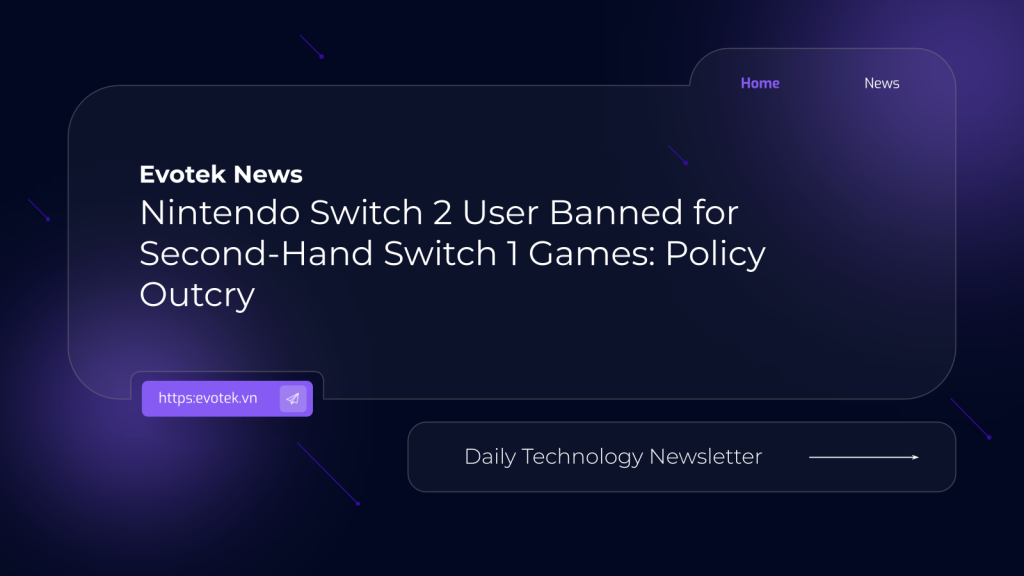A new wave of concern is sweeping through the gaming community following reports of a Nintendo Switch 2 owner being banned for simply playing second-hand Nintendo Switch 1 titles. This incident shines a spotlight on Nintendo’s notoriously strict policies and raises questions about the future of physical game ownership on its latest console.
Nintendo’s Strict Stance & Growing Concerns
Nintendo has long been known for its firm control over its ecosystem, often sidestepping consumer criticism due to the immense popularity of its consoles and games. With the launch of the Switch 2, initial worries emerged regarding the console’s ability to be permanently taken offline if users engaged with ‘mod carts,’ commonly associated with pirated software.
Now, a distinct issue has surfaced. A Nintendo Switch 2 owner, known as ‘dmanthey’ on Reddit, claims to have faced a ban after attempting to play pre-owned Nintendo Switch 1 games purchased from Facebook Marketplace. According to the user, the ban occurred when the Switch 2 detected the second-hand nature of the games upon trying to download patches for them. While this specific report has not been widely corroborated, it has ignited a fierce debate among players.
The Resolution: A Glimmer of Hope for Banned Users
Fortunately, ‘dmanthey’ managed to reverse the ban. After contacting Nintendo support and providing evidence of purchase, including Facebook listings and photos of the cartridges, their account was reinstated. This suggests that while Nintendo’s automated systems might flag such activity, human intervention can resolve the issue.
The precise reasoning behind Nintendo’s initial ban remains unclear. While reselling second-hand games is a common practice, it’s highly probable that Nintendo’s system flagged these titles under the suspicion of them being pirated. This aligns with their ongoing efforts to combat illegal software, especially given the presence of fake cartridges on various online marketplaces and the use of mod carts for pirated downloads.
The Vital Role of Second-Hand Games and Future Implications
Despite Nintendo’s increasing push towards digital downloads with the Switch 2, physical game sales continue to hold significant ground on Nintendo platforms, more so than on PlayStation or Xbox. Consequently, the second-hand market for Nintendo titles thrives. This is partly driven by the fact that Nintendo and its retailers rarely offer deep discounts on games, making pre-owned copies an essential avenue for many fans to access their desired library affordably.
If Nintendo were to systematically ban users for playing legitimately purchased second-hand games, it could lead to widespread outrage and chaos within the gaming community. This incident underscores the delicate balance Nintendo must maintain between protecting its intellectual property and supporting legitimate consumer practices.
How to Potentially Un-Ban Your Nintendo Account
Should your Nintendo account face a ban, there is a recognized process for attempting to overturn it. Many users report Nintendo’s support to be more accessible and less cumbersome than those of competitors like PlayStation or Xbox, particularly in the US.
According to ‘dmanthey’s’ experience, initiating a live chat with a human representative proved effective, leading to an immediate unbanning. While no one wants to repeatedly go through this process, having proof of purchase (such as receipts, transaction IDs, or photos of physical items) will be crucial if you encounter such an issue.
It’s hoped that Nintendo will address these concerns directly, providing clearer guidelines to prevent future misunderstandings and ensure that genuine second-hand game enthusiasts can enjoy their purchases without fear of arbitrary bans.

 日本語
日本語 한국어
한국어 Tiếng Việt
Tiếng Việt 简体中文
简体中文